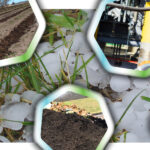
Nora Goldstein
BioCycle August 2019
I was driving to a Conference in Washington, D.C. on May 29 when my cell phone blared a tornado warning. The warning happened in the midst of a huge hail and windstorm, with balls of ice pounding my car (and taking refuge under a tree, in retrospect, was not a smart idea — and the hail still found me). The blaring cell phones have been commonplace this spring and summer, usually warning about flash flooding. It’s pretty crazy when we are in the office, and 5 cell phones go off simultaneously.
A couple weeks ago when our cell phones blared in harmony (more like a cacophony) a realization hit me: these warnings are a clarion call of the climate crisis — a loud, startling, scary clarion call. Think about how many people have cell phones, and how often these warnings are occurring. This is the climate crisis screaming at us.
Okay, that’s a bit dramatic, but think about it. I did a quick poll of coworkers, friends and family in the Lehigh Valley of Pennsylvania where we are located. Are there more frequent cell phone-generated warnings in 2019 than in recent years? (I don’t quite remember when this emergency messaging system started.) The response by all was yes. And that hailstorm I mentioned? More front yards around the Valley have contractor signs in the yard noting the homes are being serviced for hail damage. And there are even temporary hail damage repair services set up in shopping center parking lots for all the cars that got zinged.
I looked up the definition of clarion call to see if the phrase applies to my usage in this Editorial. According to the Cambridge English Dictionary, clarion call is “a clear message or instruction about what action is needed.” The frequent cell phone warnings are definitely a clarion call of the climate crisis — a clear in your face (and ears) message that action is needed. So too are the record-breaking temperatures in Europe this summer, as well as in Alert, Nunavut in Canada, the most northerly permanently inhabited spot on the planet where the temperature hit 69.8°F. A meteorologist told Smithsonian.com that “while a nice, 70° day would be welcome in most places in North America, it’s an inferno in Alert, far above the Arctic Circle at 82° latitude.”
This week, the International Panel on Climate Change (IPCC) released a Special Report on Climate Change and Land, the first ever, comprehensive look at the whole land-climate system. The press release states what BioCycle readers already know: When land is degraded, it becomes less productive, restricting what can be grown and reducing the soil’s ability to absorb carbon. This exacerbates climate change, while climate change in turn exacerbates land degradation in many different ways. “The choices we make about sustainable land management can help reduce and in some cases reverse these adverse impacts,” said Kiyoto Tanabe, Co-Chair of the Task Force on National Greenhouse Gas Inventories. Over the next several weeks, we’ll review the IPCC report to see if the authors recognize the critical role that soils amended with recycled organics plays in reversing “these adverse impacts,” and over time, sequester carbon.
The BioCycle toolbox is filled to the gills with products and services that already are being used to answer the clarion call of the climate crisis. And while a compost-amended lawn won’t do much for hail damage to the roof, it certainly will help the landscape sustain the record-high temperatures, and absorb a portion of the rainfall to help reduce flash flooding impacts. And the contractor’s signs in the front yard will read: Greener Grass + Cooler Climate: Call Us For Compost!









